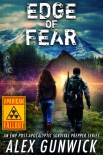Life Goes On by Tayell, Frank (large ebook reader txt) 📗

Book online «Life Goes On by Tayell, Frank (large ebook reader txt) 📗». Author Tayell, Frank
21st March
Chapter 16 - Sherlock Holmes
The surface-level radiation has been rising since we left Inhambane. Slowly. Steadily as radioactive fallout settles from the upper atmosphere. Nuclear winter is a disputed theory, rather than a scientific fact. Something I’d not realised, because, until last month, I’d not given it much thought. Of course, there was only one way of testing this theory, and fortunately, a large portion of the bombs detonated in the ocean. This will present challenges in the medium term, defined by Leo as being from six months to ten years. How insurmountable a challenge is something we’ll learn in time. For now, we can only monitor the levels, and they’re currently still low. The oceans are vast. I tell myself that over and over. But as we were passing Port Elizabeth, a southerly wind caused the atmospheric sensors to spike. We detoured out to sea, and at maximum speed.
We’ve passed Cape Agulhas, the most southerly point of the African continent, and so have left the Indian Ocean behind. We are now in the Atlantic, only a hundred and fifty kilometres from Cape Town. Night has fallen, and our speed has been cut. We’re as close to shore as the captain dares bring us. Close enough to spot electric lights. Tonight we watch. We listen on the radio. Tomorrow, we should be reunited with Laila and the African Union. What happens next is impossible to predict.
Leo is certain the radiation spike was caused by a crater, inland of Port Elizabeth. So at least one nuclear bomb detonated in South Africa. One from which radiation still plumes into the air, is caught by the wind, and dragged seaward. Leo suggested the plumes were caused by ground-based fires. From his tone, I got the impression that grim explanation was the best possible explanation. The wind has changed direction now, meaning that radiation is heading inland, and so across the path of Laila and the African Union, and there is absolutely nothing we can do to help them. It’s frustrating. It’s not that I long for action, but I hate simply being a spectator. Always have.
Growing up, everyone has a bad year. Sixteen was mine. That was the last time I kept a journal. I tried after Sydney, but the grief was too raw to express with a pen. Age sixteen was when I began to grasp how simultaneously vast, and small, the world was. How repetitive the problems. How reluctant the world was to embrace change. How, even in the far-off places where the grass was evergreen, life was little better.
Did the journal help? Perhaps. It kept me occupied during the long evenings, working in Mum’s restaurant, until Mick gave me a copy of Sherlock Holmes. Can’t have been long after his wife died. Once a week, he’d come in for a meal. Not sure who was looking after Anna. She can’t have been more than a few years old. One of her aunts, I suppose. But once a week, Mick came to the restaurant, always with a book for company. He’d sit by the window, eat, and read. I’d stay by the register, occasionally writing. Mostly the same few words over and over. Occasionally synonyms. More often doodles.
One night, a man came in looking for my mum. Except he used her old name. The name she left behind when she crossed the Yalu River. I froze. Mick noticed.
The stranger stood there. Wouldn’t leave. Said he was waiting for my mum. Mick told him to go. Bloke ignored him. Mick… By then, he’d already lived a life. He knew how the world was, and he must have known what kind of world Mum had escaped. Mick threw the bloke out into the street.
That was the first time I witnessed real violence. Not the schoolyard stuff. Fist and foot. Fast and bloody. Mick had the bloke in the dust in seconds, and kept him there while he called the police. Me? I was frozen with fear.
The stranger wasn’t a North Korean agent, just one of the human traffickers who’d smuggled Mum from the North Korean border to the Chinese airport where she’d caught the flight to Seoul. He was on the run from the Chinese authorities who, by then, were cracking down on the trade, and he’d come to shake my mum down.
Afterwards, and after the police had gone, a woman from the South Korean consulate visited. She was young, but wise. Kind as wool, yet hard as diamond. Strikingly beautiful and my instant role-model. Yep, I spent many a night re-doing my hair and wasting make-up trying to copy her look. I always assumed she was a spy. She suggested Mum move to South Korea. I’d get a place at school, and language lessons so I could catch up.
The spy stayed for a week, talking with Mum nearly twelve hours a day, in the kitchen, while they both cooked. I was not allowed to listen. Mum never told me what they talked about. After a week, the spy left. Mum announced we weren’t leaving. She liked her restaurant. She liked Broken Hill.
I hated her for making us stay in that baking, nowhere city. My misdirected anger should have been aimed at that terrorist government who abused its people to an inhuman degree. But I blamed Mum because she was nearby and I was sixteen, bullied at school, and then punished for fighting back.
Mum had cancer. A result of the forced labour she’d done as a child. That’s why she didn’t want to leave. She didn’t want me to be orphaned and friendless in a country whose language I barely spoke.
She survived it. That time.
You know the weird thing? Afterward, business boomed. There wasn’t a single night





Comments (0)